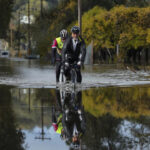Commentary
Social media could soon become an adults-only experience in at least one country before the year ends.
While the specifics are still being worked out, it seems that having an account on platforms like Instagram may only be allowed for individuals who are 16 and older. Australian Prime Minister Anthony Albanese has stated that the reason behind this decision is the negative impact social media is having on society, pulling kids away from real-life interactions and experiences. He emphasized the desire for kids to be more active in real-world activities.
Albanese firmly stated, “We are taking this action because enough is enough.”
This move appears to have widespread public support. A survey conducted in August indicated that Australians favor restricting social media access to those above 16. Parents globally are struggling to navigate their children’s internet usage, especially adolescents, as it is a new challenge that many parents have not encountered in their own upbringing.
While there are no immediate signs of Canada following suit, it is worth noting that platforms like Facebook and YouTube already have age restrictions in place for users under 13, similar to Australia. However, political decisions are often influenced by public opinion, so it wouldn’t be surprising if a proposal similar to Albanese’s initiative emerges in the Canadian Parliament in the near future.
The perception that social media is causing harm is gaining traction in Canada, mirroring Albanese’s sentiments. However, it’s essential to consider that media often highlight negative incidents involving social media while downplaying its positive aspects. As the saying goes, “newspapers never report when airplanes land safely.”
Current evidence does not conclusively prove a direct link between internet usage and youth well-being, as highlighted in a recent study across 168 countries.
Addressing age verification, Australia is implementing a digital identification system starting December 1, aiming to verify online identities. If Australia enforces strict age limits on social media access, individuals will be required to prove their age to access their accounts.
Teenagers are resourceful and may circumvent these restrictions by using VPNs to access social media from outside Australia or seeking alternative digital platforms for social interaction.
There’s a risk that prioritizing state intervention over parental guidance may hinder young people from accessing the benefits of social media due to fear of potential harms.
Daniel Angus from Queensland University of Technology criticized Australia’s plan, emphasizing the importance of evidence-based policies to prevent excluding youth from positive digital engagement and social connections.
Canada has introduced several controversial digital policies, triggering backlash from tech giants and concerns about freedom of speech. While child safety is paramount, excessive restrictions and mandatory digital IDs may not be the most effective approach.
Opinions expressed in this article are solely those of the author and do not necessarily reflect the views of The Epoch Times.
Please rewrite this sentence.
Source link






